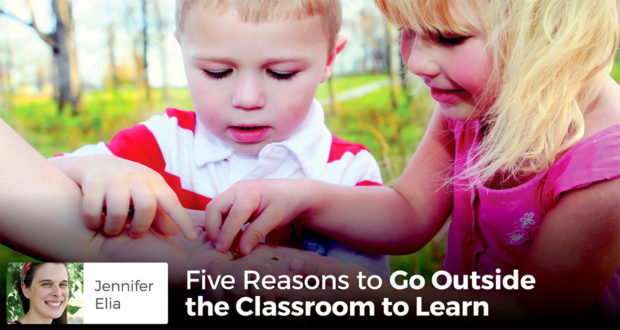Summary
Jennifer Elia has five reasons to put down your plan book and get outside of the classroom! Homeschool experiences outside the home are just too precious.As homeschooling parents, we want everything to be just right.
We spend endless hours researching supplements for our history study, choosing art supplies, organizing the school space, planning our school schedule and day format.
As a homeschooling mom of three, I know that I begin planning for the next year just days after the current school year begins. Sometimes planning and keeping on task with our curriculum can seem like a full time job.
However, it is important to appreciate the flexibility that homeschooling provides. While a solid scope and sequence and a well laid out day are important, the chance to go beyond the classroom walls is just as precious.
Here are five reasons to put down your plan book and get out of the classroom!
1. Experiencing Creation
When God formed the world and all that lives in it, He placed His crowning glory—man—in a garden. Amongst the animals and plants, Adam and Eve walked and talked with God. We were formed from the dirt, and spending time in God’s Creation can be the greatest of teachers.
You could read every book ever written about the ocean and the seashore habitat; however, you don’t fully know the wonder and beauty of the sea until you stick your toes in the sand, hear the crash of a wave, put a shell up to your ear, and see hermit crabs scurry under the water.
This past year, we joined a weekly homeschool nature walk on the breathtaking Appalachian Trail. At first, the prospect of spending three hours each week hiking and exploring made us worry that our work would never get done.
However, the time outdoors has been good for our bodies and souls, and it is amazing how much we have learned by just taking the time to take it all in.
Whether in your own backyard or in a majestic national park, get into nature and let God teach through His magnificent handiwork. Here are some tips to help you get the most out of your outdoor exploration.
- Get outside and let the children lead the adventure.
- Don’t worry about how far you make it on your hike; let the stops along the way spark curiosity and wonder.
- Try to visit the same place in different seasons and weather, to experience the changes and the cycle of life.
- Bring along some tools—a magnifying glass, binoculars, field guides, and collection bags.
- Remember to provide for basic needs (water, food, and warmth). It is best if everyone has a small backpack to carry their belongings and their discoveries.
- Spend some quiet time listening to the chorus of birds and orchestra of insects.
- Thank God for this splendid earth, and clean up any litter you encounter along the way.
2. Civics, Culture, and Art
One of the beauties and challenges of homeschooling is that your children are always with you.
However, this is also a chance for education outside the classroom walls. Taking your children to vote in an election—local or national—is a lesson in democracy and a gateway to explaining our rights and privileges under the Constitution.
Joining in on a March for Life, or other civil protest, is another lesson in civics and government.
Showing our children the blessings of our free society at work is the best way to raise informed and active citizens to lead our nation in seeking truth and preserving freedom, the real cornerstones of America.
Likewise, experiencing culture and the arts develops a well-rounded learner who has depth of appreciation, not just book knowledge. Weekday afternoons are usually the cheapest and quietest times to visit museums and galleries. Take advantage of the lack of crowds to bring little ones to the arts.
Also, many institutions and museums offer homeschool days at significantly discounted prices, and often with special, free perks. We have been blessed to visit an aquarium, several museums, a planetarium, and Colonial Williamsburg all for a fraction of what it costs during peak times.
If you have somewhere that you have been wanting to visit, be sure to ask if they have any homeschool programs or discounts—what you feel is out of reach may cost next to nothing if you just visit on the right day.
Field trips aren’t a waste of educational time; they are real, hands-on education at work that your children will enjoy and remember.
3. Socialization Outside of a Classroom
If you want to see a homeschooler wince, ask him about socialization. Although the common misconception that a child must attend school to be social abounds, socialization is still important. Learning to interact with different people and make friends out of strangers is a life skill.
Homeschooling socialization doesn’t have to look like school socialization, though.
The beauty is that our children aren’t limited to interacting only with other children of their same age or ability. Take the time to meet the people around you and experience different ways of life. You will be learning profound lessons in communication, problem solving, and sociology.
Visiting extended family, dropping by the park to play with whoever is there, taking a half day off from school to participate in a parish school club—all of these have enriched our learning experience and also helped to fight against burnout.
It’s important to build a community of friends for moms and children—to feel like you aren’t alone.
Don’t be afraid to spend time with other homeschoolers, members of your community, or loved ones, without lesson plans involved.
One of our favorite times this year has been our quarterly Book Report Day with other Catholic homeschoolers. After the presentations are over, there is plenty of time for food, fellowship, and fun.
While the twenty boys ages four to nineteen are putting together a flag football game, they are learning much about cooperation, helping others, leadership, management, sportsmanship, organization, and teamwork—no textbooks required!
4. Works of Mercy
In getting out with others, we should remember that serving God is usually the ultimate teacher.
Virtue is like a muscle; it must be exercised through practice in order to develop and strengthen.
Taking the time from a normal school day to minister to God’s people is a wonderful testament to how we are called to live. We do not know the hour when Christ will return, so we should never put off serving Him in any way we can.
Plan days of service for your parish, community, or loved ones. Putting it on the calendar and inviting others to join you will ensure that it happens. Visit a nursing home, help run a food drive, make toiletry bags for the homeless, hold a bake sale to earn money for a charity well that would provide water to those who most desperately need it.
This spring, we are planning a day, with other families from our parish, to help clean up and restore an outdoor Stations of the Cross in our area. Whatever you do, do it joyfully and without regret. Serving the LORD is never a waste of time.
Likewise, be willing to be spontaneous in your service. When you hear of a need, take the time to address it.
Don’t wait to catch up on spelling, nor to get ahead in math—it is amazing how God will multiply your time when you sacrifice some for His sake. Even if you can’t physically drop everything and run out to help, take a few moments and pray for those in need.
5. Preparing for the Kingdom, Not Just a Career
Our truest goal in this life is to become saints. My freshman year of college, my best friend asked me what the meaning of life is. She told me I could take as long as I needed to respond. Over twenty years later, I finally have the answer.
The meaning of life is the same as the first answer of the Catechism—to know, love, and serve God.
We can learn a lot about God, Christ, and the Church through books, but that isn’t really knowing.
If we “got to know” our spouse purely by what we could read in a book about him or her, we wouldn’t have much of a relationship and probably would never have actually married. Knowing God requires spending time in His presence.
Take the time away from studies to visit an Adoration chapel, attend a prayer vigil, or experience the pilgrim remains of a saint. Go on a family pilgrimage to a shrine or cathedral. In this Jubilee Year of Mercy, walk through a Door of Mercy.
Take a day off from the lesson plans and celebrate the liturgical year at home.
This is not time lost from learning, for you and your children will be learning more about our hearts’ ultimate desire.
Just as with the works of mercy, whatever you can do for the least of them will be a work that lasts for eternity. After all, we are ultimately preparing our children for Heaven, not Harvard.
What have you learned by leaving the classroom?
Do you have any favorite distractions?

 Seton Magazine Catholic Homeschool Articles, Advice & Resources
Seton Magazine Catholic Homeschool Articles, Advice & Resources

